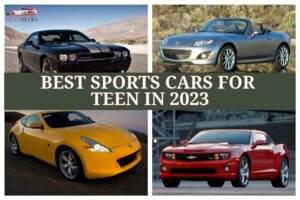In the contemporary automobile market, varied brands are constantly competing to enhance their share by creating models that embody both efficiency and style. Five eminent automakers – Ford, Honda, Tesla, BMW, and Kia, continuously strive to encapsulate the futuristic vision into their models. Below, a distinguished model from each brand has been scrutinized, to offer a glimpse into their efforts.
Table of Contents
Car Model A: Ford Mustang Mach-E
The Ford Mustang Mach-E is a pioneer effort by Ford to venture into the electric crossover domain. Carrying the legendary Mustang ethos, the Mach-E attempts to blend performance with sustainability. However, the model has faced several criticisms too, most notably concerning its build quality and long-term reliability. Another issue was a safety component. During a series of controlled car crashes with speeds of 30 mphs, the Ford Mustang did not hold up as well as its competitors.
The Mach-E faced a recall in March 2021, addressing subframe bolts issue which could potentially loosen and affect the vehicle’s stability. Additionally, some owners have reported miscellaneous electrical glitches, hinting at potential design flaws. Despite this, the Mach-E has been praised for its spacious interior and commendable electric range of up to 305 miles, depending on the model.
Car Model B: Honda Civic Type R
The Honda Civic Type R is a testament to Honda’s ability to blend everyday usability with a sporty demeanor. However, the aggressive design and stiff suspension have been points of contention among some consumers.
The model has been subject to a few recalls, including one for a potentially misprinted label displaying incorrect tire pressure information. The Civic Type R, though, has been a favorite among enthusiasts for its engaging driving dynamics and robust engine performance.
Car Model C: Tesla Model 3
Tesla’s Model 3 is emblematic of the brand’s commitment to electric mobility and autonomous driving technologies. While renowned for its futuristic interior and impressive electric range, it has had its share of quality control issues.
Numerous reports highlight paint issues, panel gaps, and electronic glitches which can be a cause for concern. Yet, with an ever-evolving software interface and its minimalistic approach, the Model 3 continues to captivate a substantial market segment.
Car Model D: BMW 3 Series
The BMW 3 Series often is seen as a benchmark in the compact executive car segment, with a balanced offering of luxury, performance, and technology. However, like any car, it has its drawbacks.
Earlier models were criticized for their steering feel, and the brand has faced recalls for issues like faulty airbags and exhaust gas recirculation module. Despite these, the 3 Series continues to lure customers with its plush interiors and spirited driving experience.
Car Model E: Kia Telluride
The Kia Telluride is a symbol of Kia’s strides in the SUV segment. Its expansive interior and modern features at a competitive price point make it a strong contender. However, some have pointed out the lack of a hybrid variant and a slightly dull driving experience as potential drawbacks.
.
Despite minor flaws, the Telluride has been widely praised for its value proposition, showcasing a blend of comfort, space, and features which continue to allure the modern family.
Each of these models, despite their flaws, reflects the concerted efforts by the automakers to balance performance, comfort, and innovation. The examination of each model delineates how brands are navigating the modern automotive landscape, embedding contemporary technologies and design elements to appeal to the present-day consumer.
The narratives of recalls and design shortcomings underline the challenges faced in achieving automotive excellence, while at the same time showcasing an eagerness to rectify and learn from these setbacks. Brands like Tesla and Ford exhibit a strong inclination towards sustainable mobility, a testament to the shifting paradigms in the automotive industry. The nuances of each model, from the aggressive demeanor of the Honda Civic Type R to the luxurious appeal of the BMW 3 Series, embody the diversified preferences of the consumer base.
As consumer demands evolve, these brands are expected to address the identified issues, enhancing their offerings to maintain a competitive edge in a bustling market. The dynamism of consumer preferences compels a constant evolution in design, technology, and performance
- Bad Rack And Pinion Symptoms You Should Never Ignore - February 10, 2026
- How To Fix Exhaust Leak Properly Without Costly Mistakes - February 10, 2026
- Fuel Pressure Regulator Symptoms And How To Spot Failure Early - February 10, 2026

